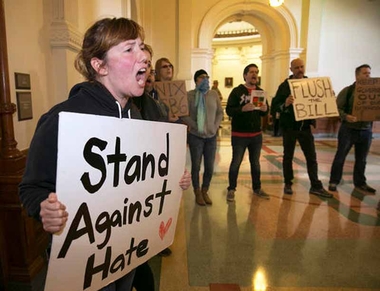New Texas bathroom bill may spark North Carolina-like uproar

Austin, Texas (AP) — Top Texas Republicans are eager to bring a fight that sparked upheaval and business boycotts in North Carolina to the country's largest conservative state, unveiling Thursday a bill that would ban transgender people from using the bathroom of their choice.
The "Texas Privacy Act" requires all Texas residents to use the bathroom or locker room according to the gender on their birth certificates and prohibits local governments from passing ordinances designed to protect gay rights in public restrooms and other "intimate settings."
"It's the right thing to do," said Lt. Gov. Dan Patrick, a Houston Republican who oversees the state Senate and quoted Martin Luther King Jr. while promoting the proposal at the Texas Capitol. "The people of Texas elected us to stand up for common sense, common decency and public safety."
Bill sponsor Sen. Lois Kolkhorst, a Republican from rural Brenham, said her "thoughtful and unique" bill won't create a "bathroom police" and will allow anyone to lodge complaints upon seeing something in public restrooms that makes them uncomfortable. She added the bill was written "not to start a controversy but to end one."
But the news conference itself caused a stir. Organizers had to close the door of a packed room after about a dozen protesters — some carrying handmade signs reading "Flush SB6" (Senate Bill 6) — launched a chorus of loud boos.
Texas' largest business lobbying group says approving the measure and other popular anti-gay rights proposals could cost the state up to $8.5 billion and 100,000-plus jobs. Yet, many conservatives in the GOP-controlled Legislature, which convenes Tuesday, are expected to embrace the "bathroom bill." It could have problems clearing the state House, though, where Republican Speaker Joe Straus has suggested it won't be the highest priority.
North Carolina's law, which went into effect last year, caused corporations, entertainers and NCAA sporting events to back out to avoid being seen as endorsing discrimination — potentially costing the state billions in lost revenue. Despite that fallout, lawmakers in at least two other states, Virginia and Kentucky, also have introduced similar bills.
Patrick was defiant regarding possible economic ramifications, noting that Houston voters in 2015 — an election that saw low turnout — defeated an equal rights ordinance designed to protect gay and transgender residents, and no problems came of it. The city is even hosting this year's Super Bowl.
"The economic doom?" Patrick asked. "The Super Bowl is teed up for 5:30 p.m. on February 7."
The American Civil Liberties Union of Texas and other rights groups sounded alarm.
"It's unnecessary, discriminatory and inconsistent with the constitutional value of equal protection for all," the ACLU's legal and policy director, Rebecca L. Robertson, said in a statement. "Make no mistake — the invidious intent of SB6 is to deny transgender Texans the ability to participate in public life."
Texas already led a 13-state coalition that successfully sued to block an Obama administration order from last year requiring public schools nationwide to let transgender students use the bathrooms and locker rooms of their choice. Attorney General Ken Paxton said in a statement Thursday that that effort meant "states are now free to enact legislation of their choosing to protect privacy."
By Will Weissert, Associated Press. Copyright 2017 The Associated Press. All rights reserved. This material may not be published, broadcast, rewritten or redistributed.
The Gayly – January 6, 2017 @ 7 a.m.





